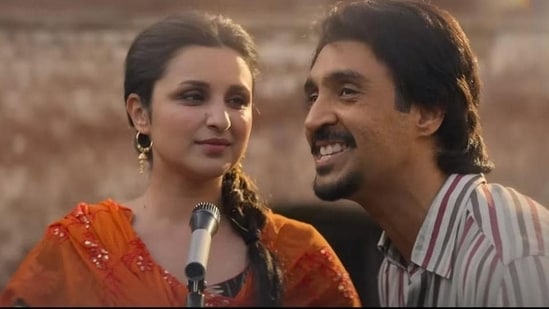
In the 1980s, singer Amar Singh Chamkila—born Dhani Ram in a Dalit Sikh family in Punjab—gained notoriety and fame for his rough musicality and teasing lyrics. His record-setting songs obsessed over incest and illicit love but were equally attuned to rural class disaffections in the toiling North. On March 8, 1988, while alighting from his car for a performance, he was gunned down by unidentified assailants in Mehsampur. His wife and singing partner, Amarjot, was also killed, as were two other members of his troupe. Multiple theories were floated, but with the state in the grip of a violent insurgency, the case went unsolved.
This haunting episode from Punjab’s checkered past has been mined for cinematic fodder before, most inventively in Kabir Singh Chowdhry’s absurdist docu-fiction “Mehsampur” (2018). Now Imtiaz Ali, co-writing with his brother, Sajid, takes a crack at Chamkila. Audiences au fait with the bare facts—and assorted gossip—of the singer’s life and death won’t be persuaded anew. Ali’s film does not clear mysteries or exorcise any ghosts. It’s a fairly straightforward reading of the Chamkila myth, more a vibrant celebration than a deep dive. Yet, even in its squareness, it manages to offer a peek into the artist’s interiority.
This happens considerably late in the film. Chamkila (Diljit Dosanjh) has sold out his Toronto show during his overseas tour of ‘87. His oily impresario is grinning from ear to ear, telling him how, when Amitabh Bachchan performed at the same venue a few nights ago, they had to add 137 extra seats. In Chamkila’s case, he proudly adds, that number has exceeded a thousand. We expect Chamkila to cheer up at this achievement; he’s been, all his life, a devout Bachchan fan. Instead, his smile fades like the morning mist.
No real explanation is provided for his blues: a narrator dryly notes that artists are strange creatures, and that Chamkila’s dejection resembled something like a loss, as though his childhood had suddenly ended. This moment, buried deep in the noise and tumult of Chamkila’s extraordinary life, is the best in Ali’s film, even if it’s wholly fictitious. Far from supplying answers about the slain Punjabi singer, mythologized to breaking point in popular discourse, it asks a gentle question: how comfortable was Chamkila, improbably baptized the ‘Elvis of Punjab’, with his meteoric rise?
Ali opens his tale with the fateful assassination, then proceeds to jumble up childhood and death, deed and aftermath, fact and hearsay. The film’s structure is a series of vignettes, some more compelling than others. We see Chamkila’s early years in a village near Bathinda, where he’s a mischievous boy with a penchant for singing. His father, a farmer, is stern and disapproving. His mother, a singer herself, is more indulgent. The young Chamkila (played by the talented Harmanjeet Singh) is a natural performer, and his voice is a gift. He’s also a rebel, refusing to bow to the rigid norms of caste and class. His love for Amarjot (Fatima Sana Shaikh) is passionate and intense. They marry against her family’s wishes, and their union is a source of strength and inspiration.
As Chamkila’s fame grows, so do the challenges. The film captures the heady mix of adulation and scrutiny. His songs become anthems for the dispossessed, the marginalized, and the lovelorn. But they also attract controversy. The lyrics are provocative, and the establishment is wary. Chamkila’s concerts are raucous affairs, with fans dancing in the aisles and singing along. His stage presence is magnetic, and his voice pierces through the night. But fame comes at a price. The film hints at the toll it takes on his personal life, his health, and his psyche.
Diljit Dosanjh delivers a powerful performance as Chamkila. His transformation from the mischievous village boy to the iconic singer is convincing. He captures Chamkila’s vulnerability, his passion, and his inner turmoil. Fatima Sana Shaikh shines as Amarjot, infusing her character with grace and strength. The chemistry between Dosanjh and Shaikh is palpable, making their love story the emotional core of the film.
Imtiaz Ali’s direction is restrained yet evocative. He avoids melodrama and lets the music speak. The songs are the soul of “Chamkila.”
